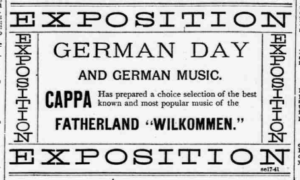 At the dinner table, on the train, or at work, we witness discriminatory language or racist remarks from time to time. We often know that we should say something, but we – for one reason or another – do not always get involved. Many people would like to do more but don’t always know how. Dr. Nancy Dome, who has worked with children and educators for over 20 years, has literally made that quandary both her business and mission. This week’s blog features an interview with the CEO of Epoch Education about fostering the understanding of diversity and the development of inclusive cultures.
At the dinner table, on the train, or at work, we witness discriminatory language or racist remarks from time to time. We often know that we should say something, but we – for one reason or another – do not always get involved. Many people would like to do more but don’t always know how. Dr. Nancy Dome, who has worked with children and educators for over 20 years, has literally made that quandary both her business and mission. This week’s blog features an interview with the CEO of Epoch Education about fostering the understanding of diversity and the development of inclusive cultures.
Tag Archives: Race
More Than Just a Blurred Ethnic Identity: Teaching German American Day
It is one of the founding myths of “German Americana” that the first migrants from German-speaking territories arrived on October 6, 1683, on North American soil. Unsurprisingly, German Americans have always sought to celebrate this particular date in order to promote and to secure German American traditions and interests. Such celebrations, formerly often called “German Day,” flourished during the 19th century and ceased after the world wars. After the 1983 tricentennial, German American stakeholders were able to revive and to continue the celebrations: On August 18, 1987, Congress approved a joint resolution to designate October 6, 1987, as German-American Day.
Since that time, most American presidents have issued annual proclamations to celebrate the achievements and contributions of German Americans to our Nation with appropriate ceremonies, activities, and programs. Also, German American societies have taken on the ‘task’ and included annual German-American Day celebrations into their calendars, often in combination with the famous Oktoberfest.

The Long March to Justice

When I was five years old, I announced my new discovery: “Negroes (the polite term at the time) are bad.” My parents tried to correct me, but I felt my logic was unshakable: When the radio reported a crime, the perpetrator was often black. They never said that a suspect was white. I didn’t know any black people in our segregated town, but I knew many white people, and none of them were criminals. This was an open-and-shut case in my five-year old’s mind.
A few weeks later, my father took me downtown to see a parade. He struck up a conversation with a black woman we were standing next to. She had a baby, who captured my interest, though I was more entranced by her Kraft Caramels (my favorite candy at the time) she shared generously with me. This, of course, completely shattered my baby bigotry.
When I was approaching middle age, I reflected on the incident. Only then did I realize that when I was young, parade-viewing areas – as well as everything else – were strictly segregated in Enid, Oklahoma. It must have taken some planning and more than a small amount of courage to arrange for us to stand in the “colored area” next to a friendly woman who just happened to have a cute baby and my favorite candies.
The issue of race did not come up often in our small, mostly white town (at least not in the white community), so I had little need to reflect on what I had learned until Emmett Till’s murder on August 28, 1955, made national news and provoked national outrage.
A Call for 60s-Style Teach-ins on Anti-Racism

Let’s start off with a few telling facts: The origin of the word “racism” stems from the French word racisme which appeared during the last decades of the 19th century. In English, however, according to the Merriam Webster Dictionary, “Racism appears to be a word of recent origin, with no citations currently known that would suggest the word was in use prior to the early 20th century.” Now, let that sink in. The people at Webster are also quick to point out that just because the word is “fairly new” doesn’t mean that “the concept of racism did not exist in the distant past.” No wonder we – and with we, I mean all societies – have a problem with racism. So let’s get to the root of it and root it out.






